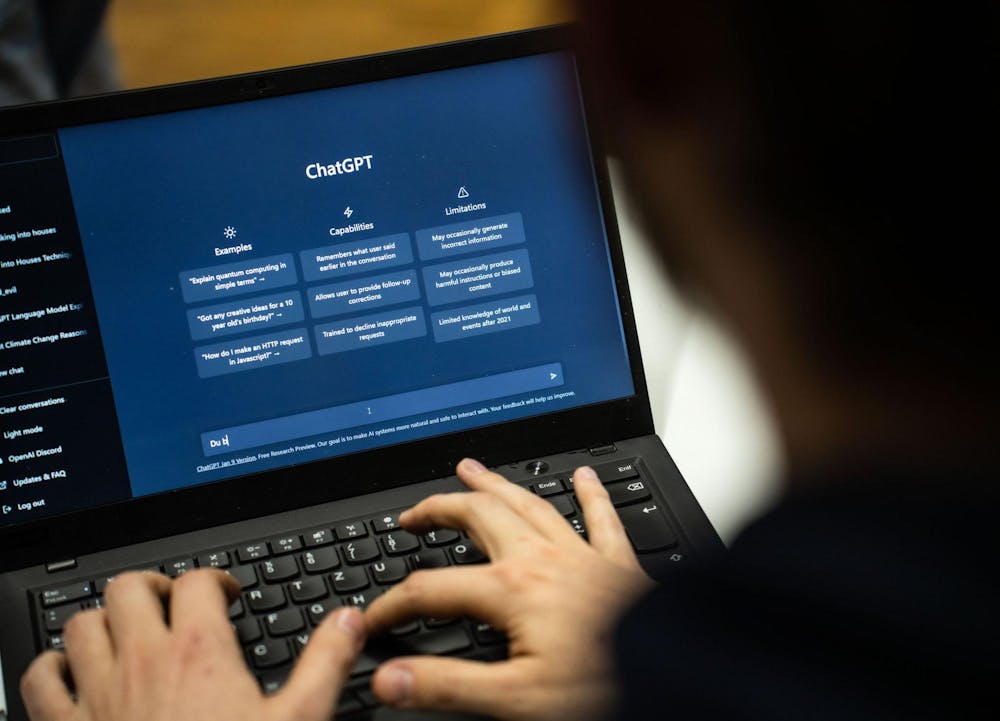“AI text generators should not be used for creating or revising drafts, editing your work, or reviewing a peer's work.”
The phrase is used in syllabi across IU classrooms, an addendum to the usual syllabus policies suggested by the university. ChatGPT was first released to the public in November 2022 and quickly gained traction and users. Since then, educators have raised concerns among educators about how it may affect students' writing skills.
“The way you learn is by trying to write it yourself,” Bonnie Layton, a senior lecturer at The Media School at IU, said. “You don’t learn by looking at an already polished piece of AI.”
Layton teaches introductory classes where students first learn how to write, and those classes include mostly freshman. Her policy in the classroom discourages the use of AI. However, she said she thinks AI has a place in the media field and that it’s important to educate students on how to work with it to prepare them for future careers.
Jeanette Heidewald is a teaching professor for the Kelley School of Business and primarily teaches honors business writing. She has a hopeful outlook on the use of AI in classes.
Her AI policy varies from section to section of the course. Instead of prohibiting its use, Heidewald collaborates with her students and uses AI to create a unique set of rules for each class regarding the technology. In her classes, students are permitted to use AI as a writing tool in the drafting process to generate ideas, organize them, and eliminate unworkable ones, and as a tutor. Students can ask the AI to evaluate its work and their work with it.
“We started with small group discussions around what the students thought and what they wanted,” Heidewald said. “Into, let's now bring in the AI teammate and ask, ‘What do you think, and do you have more ideas?’”
She said that the rules haven’t eradicated misuse of AI in her classroom but that it was an opportunity to learn and grow with her students. She said that the use of AI even improved their writing.
“So far, the students’ writing is better than it used to be, and it’s better, faster, than it was,” Heidewald said. “We’re all going to be better writers, but we are going to also rely on assistance to help us.”
She said using AI to help with writing is like using a calculator to help with math. She said when calculators were first introduced after being released commercially in 1970, they were outlawed in her high school because there was a worry that students’ math skills would worsen over time. Nowadays, many high school and college classes require using calculators.
Heidewald said fellow Kelley Professor Brian Williams is leading an initiative for a Virtual Advanced Business Technologies Department at Kelley. Williams is the chair of the department.
“We're starting a new department that incorporates faculty from all of the departments at Kelley,” Heidewald said. “We're going to create curriculum and initiate — hopefully — policies in the AI space.”
Williams said that he will also be teaching a course for Kelley students in the spring, “Introduction to Generative AI in Business,” to teach them how AI is being used across disciplines.
“We recognize that AI skills are going to be increasingly important for our students to thrive post-graduation,” Williams said. “The class is unique among business schools, and I'm really excited we are offering it.”
He agreed with Heidewald that AI has improved students' writing and encourages its use in his classes, though he mentioned a downside — it sometimes made writing too wordy.
Heidewald said she’s optimistic that if students learn to use AI to make their writing faster, they will have more time for human interaction and connection.
“Over the past 10 years, they've graduated, graduated into a world of screens, and their interaction with humans becomes more and more limited,” she said. “I think that AI is going to flip that script for us.”




